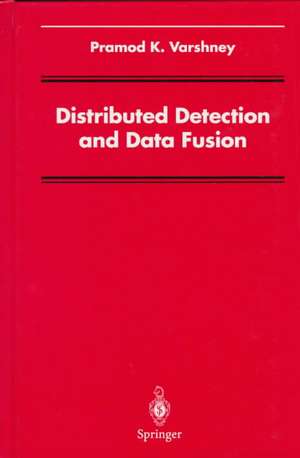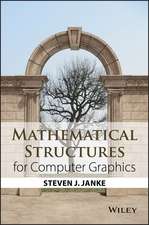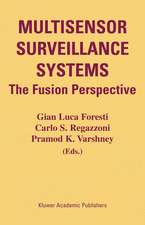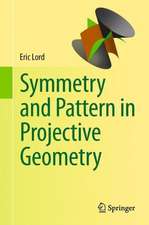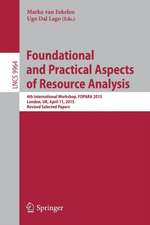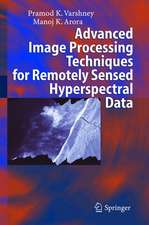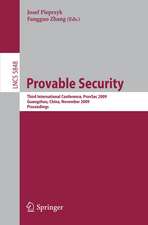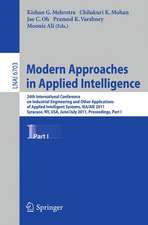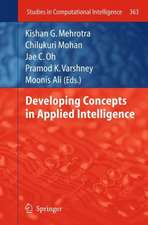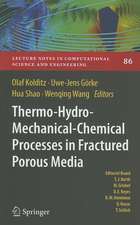Distributed Detection and Data Fusion
Autor Pramod K. Varshneyen Limba Engleză Hardback – 4 dec 1996
| Toate formatele și edițiile | Preț | Express |
|---|---|---|
| Paperback (1) | 944.36 lei 43-57 zile | |
| Springer – 26 sep 2012 | 944.36 lei 43-57 zile | |
| Hardback (1) | 950.52 lei 43-57 zile | |
| Springer – 4 dec 1996 | 950.52 lei 43-57 zile |
Preț: 950.52 lei
Preț vechi: 1159.17 lei
-18% Nou
Puncte Express: 1426
Preț estimativ în valută:
181.88€ • 190.38$ • 151.38£
181.88€ • 190.38$ • 151.38£
Carte tipărită la comandă
Livrare economică 31 martie-14 aprilie
Preluare comenzi: 021 569.72.76
Specificații
ISBN-13: 9780387947129
ISBN-10: 0387947124
Pagini: 276
Ilustrații: XII, 276 p.
Dimensiuni: 155 x 235 x 21 mm
Greutate: 0.59 kg
Ediția:1997
Editura: Springer
Colecția Springer
Locul publicării:New York, NY, United States
ISBN-10: 0387947124
Pagini: 276
Ilustrații: XII, 276 p.
Dimensiuni: 155 x 235 x 21 mm
Greutate: 0.59 kg
Ediția:1997
Editura: Springer
Colecția Springer
Locul publicării:New York, NY, United States
Public țintă
ResearchDescriere
This book provides an introductory treatment of the fundamentals of decision-making in a distributed framework. Classical detection theory assumes that complete observations are available at a central processor for decision-making. More recently, many applications have been identified in which observations are processed in a distributed manner and decisions are made at the distributed processors, or processed data (compressed observations) are conveyed to a fusion center that makes the global decision. Conventional detection theory has been extended so that it can deal with such distributed detection problems. A unified treatment of recent advances in this new branch of statistical decision theory is presented. Distributed detection under different formulations and for a variety of detection network topologies is discussed. This material is not available in any other book and has appeared relatively recently in technical journals. The level of presentation is such that the hook can be used as a graduate-level textbook. Numerous examples are presented throughout the book. It is assumed that the reader has been exposed to detection theory. The book will also serve as a useful reference for practicing engineers and researchers. I have actively pursued research on distributed detection and data fusion over the last decade, which ultimately interested me in writing this book. Many individuals have played a key role in the completion of this book.
Cuprins
1 Introduction.- 1.1 Distributed Detection Systems.- 1.2 Outline of the Book.- 2 Elements of Detection Theory.- 2.1 Introduction.- 2.2 Bayesian Detection Theory.- 2.3 Minimax Detection.- 2.4 Neyman-Pearson Test.- 2.5 Sequential Detection.- 2.6 Constant False Alarm Rate (CFAR) Detection.- 2.7 Locally Optimum Detection.- 3 Distributed Bayesian Detection: Parallel Fusion Network.- 3.1 Introduction.- 3.2 Distributed Detection Without Fusion.- 3.3 Design of Fusion Rules.- 3.4 Detection with Parallel Fusion Network.- 4 Distributed Bayesian Detection: Other Network Topologies.- 4.1 Introduction.- 4.2 The Serial Network.- 4.3 Tree Networks.- 4.4 Detection Networks with Feedback.- 4.5 Generalized Formulation for Detection Networks.- 5 Distributed Detection with False Alarm Rate Constraints.- 5.1 Introduction.- 5.2 Distributed Neyman-Pearson Detection.- 5.3 Distributed CFAR Detection.- 5.4 Distributed Detection of Weak Signals.- 6 Distributed Sequential Detection.- 6.1 Introduction.- 6.2 Sequential Test Performed at the Sensors.- 6.3 Sequential Test Performed at the Fusion Center.- 7 Information Theory and Distributed Hypothesis Testing.- 7.1 Introduction.- 7.2 Distributed Detection Based on Information Theoretic Criterion.- 7.3 Multiterminal Detection with Data Compression.- Selected Bibliography.
